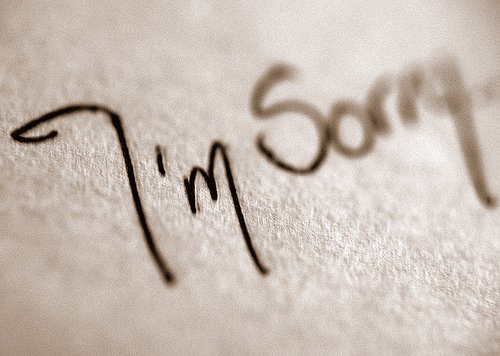
People often say that an apology is a good way to have the last word. If that is so, then why is it difficult for many people to apologize — even when they know they’re wrong?
I talk to a lot of well-meaning parents who try to teach their kids right from wrong by insisting that they “Be nice; say you’re sorry” in pretty much any situation. But this isn’t a good habit to foster, because there’s no reasoning behind it. Why should the child apologize for no reason other than … just because.
This approach can create two types of people: (1) the meek and, (2) the arrogant. The meek apologize no matter what, while the arrogant feel like they never have to apologize. Neither one is mentally healthy.
Everyone needs to operate on a sense of justice, i.e., sticking to, and honoring, the facts. “Was I wrong in what I said or did? Do the facts prove it? If so, I should acknowledge it.” An apology does just that. When you apologize, you’re saying: “I know I was wrong, and I regret it.”
Encouraging others (or ourselves) to be meek and humble is no way to achieve justice. What matters is whether you’re right or wrong, according to the facts. The goal is not to be — or to be — sorry. The goal is to acknowledge the truth.
An apology is a healthy, self-interested act, and the greatest effect is on the person apologizing. Psychotherapist and author Beverly Engel, writing in Psychology Today, says, “Apology is not just a social nicety. It is an important ritual, a way of showing respect and empathy for the wronged person. Apology has the ability to disarm others of their anger and to prevent further misunderstandings. While even a sincere apology can’t undo harmful past actions, it can undo the negative effects of those actions.” The key word here is “acknowledging.” We all need to feel visible.
An apology must be sincere and proven through action. If you did something wrong, but you apologize, that’s only the beginning. The next step is for you to prove that sincerity by not doing the same thing again. If you say it, you should mean it and be prepared to prove it.
A person who cannot or will not admit wrongdoing is emotionally blocked. He or she might have an unrealistic need to be perfect, and feels that admitting an error is a sign of weakness. In personal relationships, especially marriage or some other committed relationship, this attitude can do a lot of damage.
People who won’t apologize are cheating themselves. They trample their own sense of justice while creating unnecessary barriers to intimacy. Engel writes, “The debilitating effects of the remorse and shame we may feel when we’ve hurt another person can eat away at us until we become emotionally and physically ill. By taking responsibility for our actions we help rid ourselves of esteem-robbing self-reproach and guilt.”
Apology doesn’t necessarily have to aim for (or result in) forgiveness. Consider a husband or wife who cheats. The apology might sound something like this: “I know I ruined our relationship and there are no excuses. I know I’ve lost you for good. But I want you to know that I regret what I did and that I know I was wrong.” There are things in life that are unforgivable, but even then an apology can count for something.
I like the notion of an apology being “the last word.” Far from a cynical ploy, it serves to remind us that acknowledging the facts — including those that make us look bad — is the healthiest way to behave. Consider apology as a way of honoring what you know to be true, while at the same time honoring yourself and those about whom you care.
Follow Dr. Hurd on Facebook. Search under “Michael Hurd” (Rehoboth Beach DE). Get up-to-the-minute postings, recommended articles and links, and engage in back-and-forth discussion with Dr. Hurd on topics of interest. Also follow Dr. Hurd on Twitter at @MichaelJHurd1
Dr. Hurd is now a Newsmax Insider! Check out his new column here.
